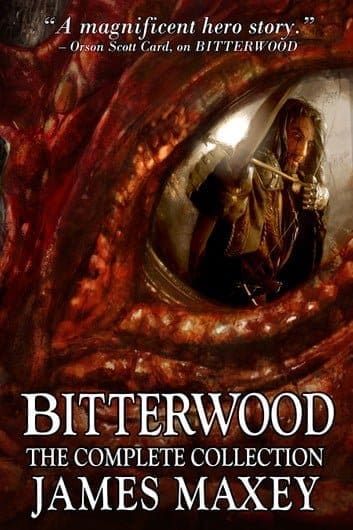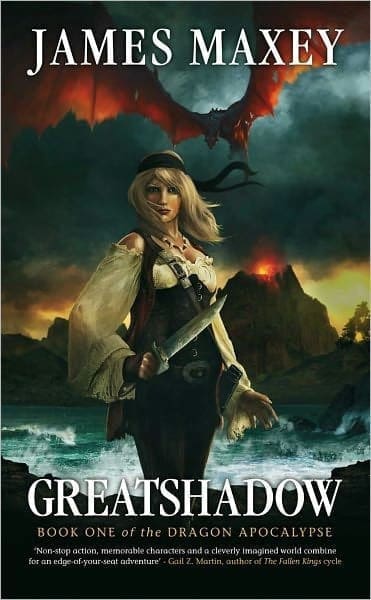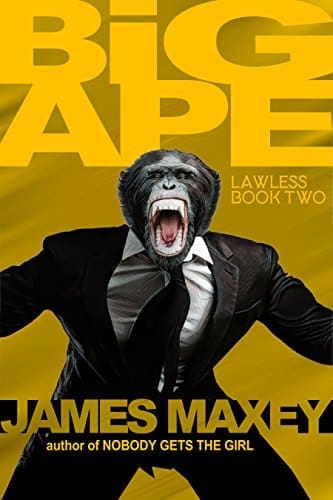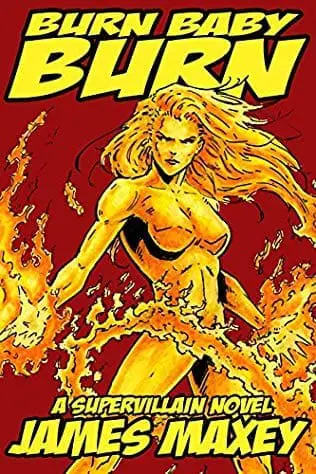An Interview with Bitterwood and Dragon Apocalypse Author James Maxey

Jamex Maxey is a Phobos award-winning author (Nobody Gets the Girl) and 2015 Piedmont Laureate, who is best-known for his dragon novel series, The Bitterwood and Dragon Apocalypse sagas. Recently, Jason Ivey had the opportunity to interview Mr. Maxey on behalf of Horror Tree about his work and his other interests.
HORROR TREE: Looking over your bibliography reveals a fascination with dragons. What would you say makes them so appealing to you?
JAMES MAXEY: There’s a sincere answer and a more cynical one. Both are about equally parts true. The sincere—if nerdy answer—is that I was a major D&D geek from my late teens through my mid-thirties. I moved around a lot during this time, and one of the first things I did when I moved to a new area was to find a gaming store and look for games to join. It was my primary path to having a social life.
Playing AD&D [Advanced Dungeons & Dragons], I sort of hooked on to dragons as the Alpha Monster. I mean, it’s right there in the title. Yeah, I might pit my players against undead lords and wicked queens and the occasional giant, but when it came right down to it my favorite campaigns always built up to a battle with a dragon. As a DM [Dungeon Master], you need to really get into the heads of the characters you’re responsible for. If I used a dragon, I had to really put some thought into its goals and motives and personalities. Accumulating treasure indicated some sort of economic system. The fact they could speak and collected books hinted that as a race they had some sort of culture. Fleshing out these big, scaly beings to give them motives and backstories led rather directly into using these beasts in novels. I’m not ashamed to admit that some of the dragons in my books made [their] first appearances in long ago D&D campaigns.
As for a more cynical answer, well, dragon books sell. I never write a book purely to make money. I really only work on projects I feel passionate about. But, since my dragon books have a wide readership, I get a lot more fan interaction. People ask questions about my worlds that I can’t immediately answer. So, I start pondering on, say, why there were no female sky-dragons or earth-dragons in the first Bitterwood novel, which was an actual reader question. That led to me thinking about the different reproductive strategies of the dragon races, and the fact that female sky-dragons live isolated from the males became a giant plot driver in Dragonforge, and will play an even bigger role in the upcoming Dragonsgate novel.

HT: Bitterwood (The Bitterwood saga) and Infidel (The Dragon Apocalypse saga) are the respective protagonists of their series. Besides gender, how else are they unique? Similar? Which of them seems like the ultimate dragon slayer, i.e. could survive in either of your dragon-universes?
JM: Avoiding specifics, one of these characters doesn’t survive the events of their series and the other does. So, technically, one character wins as the survivor by default.
Stepping back into a more loose interpretation of the question, Infidel would tear through the dragons from the Bitterwood novels without even mussing her hair. She goes head to head with elemental dragons the size of islands in her own adventures. The non-magical, big flying reptiles of the Bitterwood series would get pounded into paste unless they just asked her to please not hit them anymore. She’d probably stop and talk things over with them. She’s a very reasonable person.
Her capacity to make peace with her foes is one of the central differences between Infidel and Bitterwood. Bitterwood is mostly motivated by darkness. He kills dragons because he hates them. If one begged for mercy he’d kill it just a little slower to enjoy its whimpering. Except, ‘enjoy’ isn’t quite the right word. Bitterwood doesn’t have fun in his ongoing war with dragons. There’s a reason the word bitter is part of his name. He’s cold and occasionally—cruel. He kills without remorse. He’s a psychopath. Yet, his focus and skill make him a heroic figure to other humans. He’s defined by his enemies. Since his dark urges find release in the slaughter of dragons, humans think he’s fighting on their side, but he’s not. He’s just driven to kill dragons by his own personal demons. That said, if you’re a human during the dragon age, you probably sleep better thinking that Bitterwood is out there reducing the dragon population.

Infidel, on the other hand, very much enjoys fighting whoever and whatever, but not because she hates anyone. It’s a more childish feeling of triumphing over anyone bigger who stands in her way. She’s dangerous but not sadistic. She’s fallen in among violent men in a savage land and, due to her magical gifts, happens to be really good at putting bullies in their place. She’s carefree but reckless, protected from the consequences of her choices by her enchantments. She’s got a good heart, but due to her upbringing she’s a bit selfish and walled off emotionally. She really only has one friend, and she keeps her past a secret even from him. I think she doesn’t open up and grow as a character until she starts to open up to Aurora. Until then, though she’s well into adulthood, she’s basically crashing through life as a very powerful child.
While you didn’t ask the question, if it came down to a fight between Bitterwood and Infidel, even if she was at the peak of her magical strength and toughness, Bitterwood would still win. Infidel’s powers make her sloppy. Swords bounce off her skin, so she’s never learned to duck or dodge. Her primary sword skill is hacking, which she’s amazing at, but she relies entirely on brute strength. Bitterwood, on the other hand, plans, practices, and perfects his combat skills. Assuming Infidel didn’t take him by surprise and floor him on her first punch, he’d keep out of her reach until he figured out how to use her strength against her. It’s sort of a Batman versus Superman deal. Superman would rely on his powers, but Batman would rely on his training and strategy and win out in the end.
HT: Since you brought up Bitterwood vs. Infidel, I’m curious, who do you think would win in a battle between Smaug vs. Greatshadow (The fire dragon from Dragon Apocalypse)?
JM: You know I’d be rooting for Greatshadow. Greatshadow’s primary advantage would be that he’s not stuck in one body. Smaug might kill one of his avatar bodies, but unless he could track down and vanquish Greatshadow’s soul in the abstract realms, Greatshadow could just make more avatars and keep fighting. That said, if I were tasked to actually write that story, I’d probably go the Marvel route. They’d fight each other for a while, then team-up to go fight the real enemy who’d tricked them into fighting in the first place. Better give up that pipe, Gandolf. A single match is all Greatshadow needs to find you.
HT: Besides your dragon-themed novels, you also do superhero novels too. You have a really unique take on the superhero genre with your characters like: App; the world first open-source superhero who can download body hacks, Cut Up Girl, who can make exploding clones by cutting off her arms, and Nobody, an intangible spy whose life was literally erased by a time-machine accident.
HT: Would you mind telling us more about your unique take on this genre? Do you have aspirations of writing comic books?
JM: I won’t pretend that I’m not a HUGE comic book fan. And, sure, I sometimes think of a great story I could tell if I were writing Superman or Squirrel Girl. But, ultimately, I’m devoted to telling stories in prose rather than pictures. Novels are as close as humans get to telepathy. It’s a very intimate art form, but it obviously has limits. The reason a picture is worth a thousand words is because words can sometimes be just awful at their job. I might need five thousand words of writing to explain the same information you could get from watching a thirty second YouTube video. But, the discipline of fitting infinite content into a confined form is the central struggle of all art. Taking superheroes and translating them into a medium where they aren’t quite as dominant helps me create something new and fresh. It works the other way, too. Bill Sienkiewicz adapted Moby Dick into a graphic novel. P. Craig Russel adapted Salome. They take something familiar and show it in a fresh way. That’s my goal as well.
“Novels are as close as humans get to telepathy.”
— James Maxey
I’ve always had a love of obscure and absurd characters. If DC released a hundred dollar premium hardcover Matter Eater Lad graphic novel tomorrow morning, I’d be reading that sucker by lunch time. So, one of the connecting threads among my superhero books is that I like to focus on characters with crappy superpowers. Or, maybe they have a pretty decent superpower, but have some sort of personal or moral flaw that interferes with their heroes journey.
Big Ape in my Lawless novels is a good example. His power is that he’s a big ape. He’s got some anger management issues and a serious body odor problem. His love life is a mess. He’s got a girl friend whose power is cursing at people until their hair catches on fire, literally. And, of course, he’s covered in fur. But he’s also in love with his best friend Val, though he regards her as off-limits, and during the course of his adventures his faithfulness to Jenny, his actual girlfriend, is put to the test by yet a third woman and it’s not a test he does well on. Again and again Harry (Big Ape) makes terrible decisions. And at the core of his character there’s this existential loneliness. He’s half man, half ape created by a supervillain, and the only member of his particular hybrid species. He tells Val that he won’t die, he’ll go extinct. His never ending battle to find happiness in the midst of all the insanity that surrounds him is what makes him so compelling to write about.

HT: Do you have a favorite horror/fantasy story or author? Was there any specific one that sparked your interest to become a storyteller?
JM: This is a tough one. There are very few authors who I throw myself into entirely. When I was younger, I was a big fan of Piers Anthony, and later I grew to love Terry Pratchett. But, each has such massive catalogs that after a half dozen books or so I felt like I had to move on. My reading tastes are very eclectic. I like big, dense Russian novels, quick and quirky mysteries, hard SF, humor in the vein of Pat McManus, classic novels like Middlemarch [by George Eliot] or Jude the Obscure, westerns, ghost stories, histories, graphic novels… I’m just all over the board on fiction, and my non-fiction reading choices often leave my wife rolling her eyes. Seriously? I’m reading a book about oysters? Circus freaks? Dark matter? Bicycles? The history of fonts? Why does anyone read a history of fonts? I want to read everything, which leaves me weirdly disconnected from having a favorite genre or author. I love browsing used book stores and library book sales and stumbling across a book on a subject or of a genre I never even thought of. I’m a knowledge junky.
As for a book that sparked it all, when I was very young I used to read a series of boy’s science fiction books featuring a young hero named Danny Dunn. I think I can credit them for igniting my love of science fiction. The other book that really pushed me into becoming a fantasy author was, as implied in a previous answer, the 2nd Edition Advanced Dungeons and Dragons DM’s Guide. It laid out the elements you needed to run a good campaign: the characters, settings, goals, and rewards. And, in retrospect, the practice of designing a D&D campaign has a lot of overlap with the skills you need to develop if you want to write novels.
The very first novel I ever wrote was actually a rather pretentious “literary” novel about a homeless man. It was terrible. One of my friends that I played D&D with just flat out asked why I didn’t try writing fantasy since I was so good at being a DM. And, I thought, hmmm. And thus, my life was forever changed.
HT: If a new reader were being introduced to your work, do have a book/series that you would recommend? Do you have any book/series you would most like to be recognized for creating?
JM: This is another tough question. My supervillain novel Burn Baby Burn is a contender. I wrote the whole first draft in a week, the book just flowing out of me seamlessly, and I still love every word of it. But, it is a story about supervillains who do some terrible things, and it has fairly explicit violence, language, and sexual content, so it’s not for everyone. If I had to pick just a single book with the broadest appeal, Greatshadow is probably the best introduction to my work. It’s got a blend of both dragons and superheroes, just plain bonkers fight scenes, and a lot of humor and a lot of heart. If you like it, you’ll probably find something to like in just about anything I’ve published.

HT: What are some of your upcoming books/projects that readers can look forward to?
JM: I’ve just finished the third draft of a novel called Dragonsgate: Devils. It’s got dungeons and dragons and dinosaurs. It’s the nerdiest thing I’ve written to date, set in my Bitterwood universe, but launching a brand new trilogy.
I’m also writing a book about how to write books. I’ve written over twenty books, taught workshops, served for a year as a Piedmont Laureate lecturing on the art of writing. I’ve written more blog posts and essays on writing than I care to count. I originally intended just to collect my essays and release them as a book, but it felt disjointed. There was no overall masterplan. So I ditched that and am banging out a unified manuscript that provides the secrets to writing fiction and making money from it.
HT: That’s actually a good segue into my final question. Do you have any advice for aspiring writers that you care to offer? Perhaps something learned from dealing with publishers, or other aspects of the writing profession?
JM: Yes. Here’s the central premise of my writing book: Turning your daydreams into dollars isn’t hard. I mean, it’s not simple, but it’s certainly doable if you’ve got an imagination and a basic command of the language. The main physical requirement is a ton of time with your butt in a chair and your hands on a keyboard. I still can’t get over it! People pay me money for making stuff up! I spend my days thinking about dragons and superheroes and somehow this pays my light bill, puts a car in my driveway, a roof over my head, and provides health insu— okay, actually the fact that my wife has a good job provides the health insurance. I’ve found some real world limits on how far I can push this grift [gift?].
Still, if you want to make some money writing books, it’s easy to get lost in the thickets of plotting and publishing and promotion, easy to have your heart sink as you contemplate fourth and fifth and sixth drafts. You’ll tear your hair out as editors quit, and publishers fold, and ten thousand books a day flood Amazon leaving your newly released book washed away in the flood of titles. But it’s okay! Don’t lose sight of the big picture! Writing ain’t rocket surgery. Making money writing fiction really comes down to a tried and true formula:
Daydreaming + Typing = Profit!
It really is that easy. The only things about the process that are even a little, tiny, eensy bit difficult are (1.) The daydreaming, (2.) The typing, and (3.) making a profit. But I’ll explain how to get around these difficulties. It’s why I’m taking the time to write a book, instead of just selling a button that says: “Daydream, Type, Profit,” and calling it a day.
HT: Thanks James for taking the time to speak to Horror Tree!
Mr. Maxey’s forthcoming novel Dragonsgate: Devils is set to be released in 2020. If you would like to know more about his work you can do so by visiting the following links below.
Dragonsgate: the Worlds of James Maxey: This Facebook group started by a fan is a good place to hear about James Maxey’s upcoming events and newest releases.
James Maxey Amazon Page: This is where you can find all of the author’s available titles to purchase.
James Maxey: This is the author’s official website where you can learn more about him.











